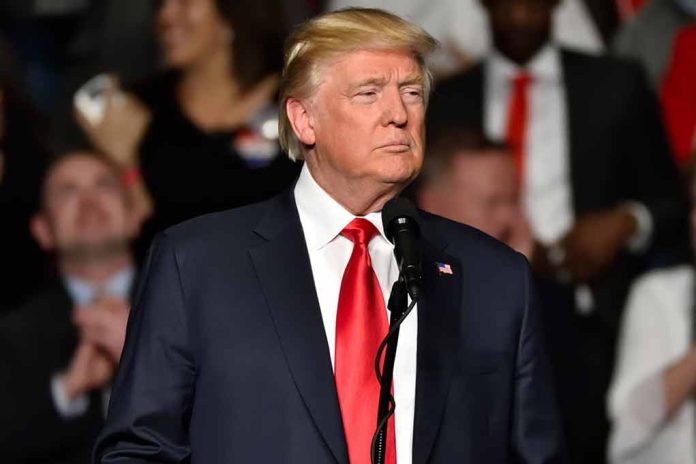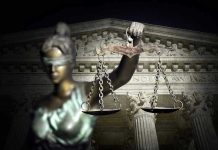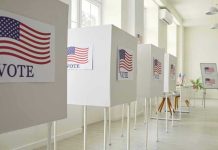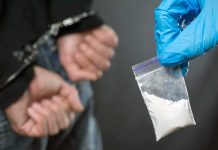
Manhattan prosecutors open the door to delaying President-elect Trump’s sentencing until 2029, sparking debate over presidential immunity and legal precedents.
At a Glance
- Manhattan DA proposes December 9 deadline for new legal motions
- Trump’s original November 26 sentencing date faces potential delay
- Prosecutors maintain opposition to case dismissal while considering timeline adjustments
- Case involves 34 counts of business record falsification from 2016
- Supreme Court’s ruling on presidential immunity plays crucial role
Prosecutors Signal Openness to Sentencing Delay
In a significant development, New York prosecutors have indicated they are open to delaying President-elect Donald Trump’s sentencing in the Manhattan criminal case until after a potential second term in 2029. While prosecutors continue to oppose dismissing the case entirely, they have suggested alternative approaches to handle Trump’s conviction on business record charges. This move comes as Trump’s legal team pushes for case dismissal, citing presidential immunity considerations and the implications of his recent election victory.
The Manhattan district attorney’s office has requested a new deadline of December 9 for both parties to file new motions. This proposal aims to address the complex legal issues surrounding the case, including the impact of Trump’s re-election and the Supreme Court’s recent ruling on presidential immunity.
A day after New York prosecutors said they will fight efforts to dismiss Donald Trump’s hush money conviction, the president-elect’s lawyers urged a judge to ignore them and dispose of the case before he takes office in January.https://t.co/6fPDIpZsZ7
— The National Desk (@TND) November 21, 2024
Case Background and Implications
Trump was convicted in May on 34 charges of falsifying business records related to an alleged cover-up of a potential sex scandal before the 2016 election. The charges stem from what prosecutors claim was a hush-money scheme during the 2016 campaign, which they argue amounted to election interference. Trump has consistently denied these allegations and claims political persecution.
“The DA is saying that the court should put off sentencing until after Trump leaves the White House,” Mitchell Epner told BBC News.
This case marks the only guilty verdict among Trump’s four criminal cases, making its outcome particularly significant. The final resolution remains uncertain as Trump prepares to assume office, with legal experts suggesting he may avoid legal punishment despite potential sentencing options like fines, probation, or prison.
Legal Strategies and Timelines
Trump’s attorneys, Todd Blanche and Emil Bove, have requested to file a motion to dismiss the case by December 20, just before Trump’s inauguration. This strategy appears aimed at delaying proceedings to prevent sentencing before Trump takes office, after which the case might be frozen or dismissed. In contrast, Manhattan District Attorney Alvin Bragg has proposed a faster timeline, suggesting Trump file his brief promptly with prosecutors responding by December 9.
“I think there’s less than half a percent chance that he’d be sentenced next week,” Diana Florence, a former Manhattan prosecutor, told BBC News.
The judge overseeing the case, Juan Merchan, faces critical decisions regarding the timing of Trump’s sentencing and whether to adjourn it. Additionally, Judge Merchan must consider the impact of the Supreme Court’s presidential immunity decision on Trump’s conviction.
Broader Legal Landscape
This development in the Manhattan case occurs against the backdrop of Trump’s other criminal cases, which have been paused following his re-election. The Supreme Court’s ruling in a separate case that presidents have immunity from criminal prosecution for “official acts” adds another layer of complexity to the legal proceedings.
While Trump’s team argues for immediate dismissal based on his election victory and claims of presidential immunity, prosecutors maintain that the case does not involve official presidential duties and occurred before the Supreme Court’s decision on presidential immunity. As the legal battle unfolds, the outcome of this case could set significant precedents for presidential accountability and the limits of executive immunity.
Sources:
- Prosecutors back delaying Trump sentence until he leaves White House
- Trump’s Lawyers Urge Judge to Ignore Prosecutors, Dismiss N.Y. Conviction
- Trump calls for hush money dismissal; bids to run out clock on case














